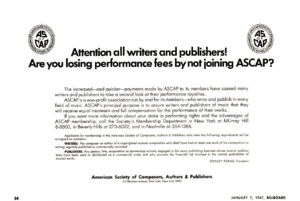American Society of Composers, Authors and Publishers facts for kids
 |
|
|
Trade name
|
ASCAP (1914–present) |
|---|---|
| Not-for-profit | |
| Founded | February 13, 1914 |
| Founders | Irving Berlin Victor Herbert Louis Hirsch John Raymond Hubbell Silvio Hein Gustave Kerker Glen MacDonough George Maxwell Jay Witmark Nathan Burkan Jean Schwartz |
| Headquarters | New York, New York, U.S. |
|
Key people
|
Paul Williams (president) Elizabeth Matthews (CEO) |
The American Society of Composers, Authors and Publishers (ASCAP) is a special group in the United States. It is a not-for-profit organization. This means it doesn't try to make money for itself. Instead, it helps musicians, songwriters, and music publishers.
ASCAP makes sure that when music is played in public, the people who created it get paid. This includes music played on the radio, in restaurants, or on streaming services. ASCAP collects money from these places. Then, it gives that money, called royalties, to its members. This way, creators don't have to ask every radio station or restaurant for money. And places that play music don't have to find every single songwriter.
In 2024, ASCAP collected about $1.84 billion. It paid out about $1.7 billion in royalties to its members. The organization keeps track of around 20 million songs. As of 2024, about 1 million people were members of ASCAP.
Sometimes, ASCAP has faced criticism. People have questioned its rules for music played at informal events. This includes things like campfire singing or open mic nights. Some have also said ASCAP is not always clear about how it works. They also keep some royalties instead of paying them all to artists.
History of ASCAP
ASCAP was started on February 13, 1914. It was founded in New York City. Many famous composers and writers helped create it. These included Victor Herbert and Irving Berlin. Their main goal was to protect the music of their members. Most early members were writers and publishers from a music area called Tin Pan Alley.
Some of ASCAP's first members were very well-known. They included George M. Cohan and John Philip Sousa. At first, you had to be able to read and write music to join. This rule later changed. It used to keep out many country music writers. But Irving Berlin was allowed to join even without this skill.
In 1917, a big court case happened. It was called Herbert v. Shanley Co. The Supreme Court decided in favor of ASCAP. The case was about a restaurant playing music without paying. The restaurant owner said he didn't need to pay because he didn't charge for the music. But the court said that if music helps a business make money, the creators must be paid. This decision made ASCAP's role very important. It allowed ASCAP to get payments for its members' music.
In 1919, ASCAP made a deal with a similar group in Great Britain. This was the first time they agreed to represent each other's music. Today, ASCAP has deals with groups all over the world. This means music creators from other countries can get paid when their music is played in the U.S.
Radio's Impact on Music
When radio became popular in the 1920s, it brought new income for ASCAP. At first, ASCAP charged low fees for radio stations. This helped radio grow. But between 1931 and 1939, the fees went up a lot. ASCAP said this was because radio made it harder for members to earn money from sheet music and record sales.
In 1940, ASCAP tried to make its fees even higher. Radio stations decided to fight back. They started a boycott of ASCAP music. They also created a new group called Broadcast Music, Inc. (BMI). For ten months in 1941, no ASCAP music was played on major radio stations. Instead, stations played different kinds of music. This included music like rhythm and blues or country. These styles had not been as popular with ASCAP. After this time, ASCAP agreed to lower fees.
In 1941, the U.S. government filed a lawsuit. This led to ASCAP and BMI agreeing to special rules. These rules made sure both groups offered licenses to everyone. The fees would be agreed upon or set by a judge.
Growing Membership and Competition
ASCAP's members became more diverse in the 1940s. Jazz and swing musicians joined. In those days, ASCAP and BMI would send people out to find new songwriters. One ASCAP employee was Loring Buzzell. He later started his own music publishing company.
BMI had different rules. It offered advance payments for songs. It also welcomed country music and rock and roll earlier. This helped BMI grow its share of the music market. In 1953, ASCAP sued BMI. ASCAP also tried to get Congress to investigate BMI. They even pushed for laws to stop radio stations from owning parts of BMI. ASCAP and BMI settled their lawsuit in 1962.
In the 1950s and 1960s, television became a new way for ASCAP to earn money. This is still important today. With the rise of FM radio, more new members joined ASCAP. During this time, ASCAP also tried to get back the position it lost during the 1941 boycott.
The folk music revival of the early 1960s was important for ASCAP. Member Bob Dylan was a big part of this. When Dylan started playing rock music, ASCAP gained a foothold in that genre too.
By 1970, new leaders at ASCAP wanted to attract more songwriters. They wanted to bring them over from BMI. This led to Motown Records moving most of its music publishing to ASCAP in 1971.
In 2009, ASCAP sued AT&T and Verizon Wireless. This case was about ringtones. ASCAP said that ringtones played in public were like a public performance of music. They wanted more money for this. Critics worried that ASCAP might try to charge regular people for ringtones. ASCAP said they would not do this. The court dismissed the lawsuit in October 2009. The judge said that playing a ringtone in public was not copyright infringement.
ASCAP licenses music to many places today. This includes over 11,500 local radio stations. It also works with hundreds of thousands of other places. These include bars, restaurants, and theme parks. ASCAP also has deals with nearly 40 music groups in other countries. This helps license billions of music performances around the world each year.
See also
 In Spanish: Asociación Estadounidense de Compositores, Autores y Editores para niños
In Spanish: Asociación Estadounidense de Compositores, Autores y Editores para niños
- BMI
- Copyright collective
- United States v. ASCAP
- PRS for Music, a British music copyright collective
 | Percy Lavon Julian |
 | Katherine Johnson |
 | George Washington Carver |
 | Annie Easley |


